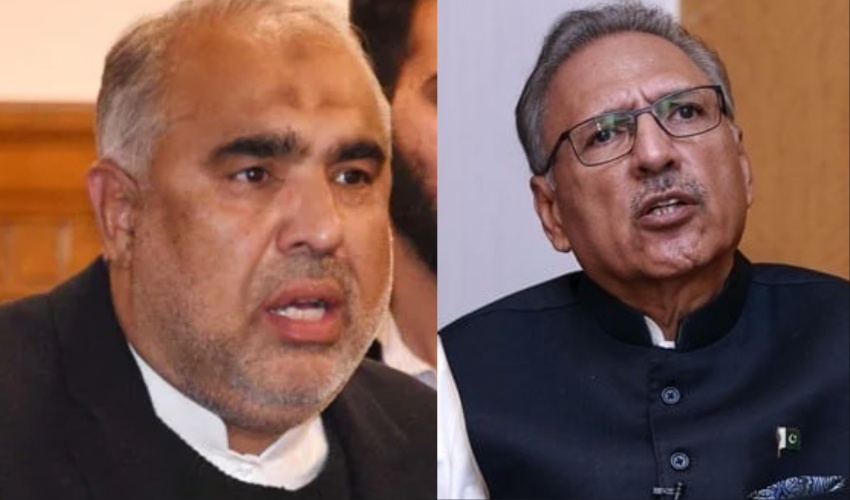Pakistan Tehreek-e-Insaf (PTI) leaders Asad Qaiser and Arif Alvi expressed strong disapproval on Tuesday over the trials and rulings made by military courts, raising concerns about the international backlash, including from the European Union and the United Kingdom.
Speaking in Peshawar, Asad Qaiser voiced deep disappointment with the military court decisions, stating, “We are extremely concerned about the trials and verdicts passed by military courts, and these concerns are being echoed globally by international bodies. The right to a fair trial must be protected, and civilians should not face military court rulings.”
Qaiser underscored that PTI’s ongoing struggle is rooted in upholding the constitution and ensuring the rule of law. He accused the government of abusing its powers, which he argued was becoming a troubling part of Pakistan’s political history.
“We are steadfast in our commitment to the supremacy of the law. We advocate for an independent judiciary and for the protection of civilian rule in the country,” Qaiser affirmed. He also expressed concern over recent developments, including controversial decisions by the Supreme Court and laws curbing peaceful protests.
“The constitution guarantees the right to protest peacefully, yet laws are being passed that prohibit such gatherings in Islamabad. Isn’t Islamabad a part of Pakistan?” he questioned.
The PTI leader also highlighted growing public dissatisfaction with the government’s treatment of PTI leaders and workers. “People perceive the actions against us as acts of vengeance,” Qaiser noted, adding that 99 percent of the public believes the charges against PTI leaders, including Imran Khan, are politically motivated and without merit.
Qaiser called for a judicial inquiry into the incidents of May 9 and November 26, which have been sources of significant tension between the opposition and the government. He reiterated PTI’s demand for the release of political prisoners, including Imran Khan and other detained party members, whom he claimed had been wrongfully incarcerated.
“We are not asking for special treatment but demanding that unlawful actions be corrected,” Qaiser asserted, stressing that Pakistan’s crisis could only be resolved by adhering to the constitution and the rule of law.
Regarding the ongoing talks with the government, Qaiser confirmed that the first round of discussions had concluded, with the next session scheduled for January 2. He expressed cautious optimism about the future of the negotiations, particularly given the country’s severe economic and political challenges.
Alvi Calls for Immediate Withdrawal of Cases Against PTI Leadership
Meanwhile, former President Arif Alvi emphasized the urgent need for the immediate withdrawal of cases against opposition leaders as a crucial step toward resolving the ongoing political crisis.
Speaking to the media, Dr. Alvi pointed to the immense financial losses Pakistan had suffered over the past few years, estimating the damage at $70 to $80 billion. “The ruling party and parliament have drained the country’s resources, leading to severe economic consequences,” Dr. Alvi said. “The people of Pakistan are yearning for change, and that change is inevitable.”
He also condemned the international community’s response to Pakistan’s handling of civilians in military courts. “The world will condemn any attempt to try civilians in military courts,” Dr. Alvi warned, emphasizing the impact on Pakistan’s international standing, particularly with the European Union.
Dr. Alvi expressed concern over the country’s inability to attract foreign investment and financial support, noting, “No money is coming from anywhere. Not a single penny of investment has been received.” He also pointed to the erosion of democratic institutions, the judiciary, and the constitution as efforts to marginalize PTI leader Imran Khan continued.
Referring to the 26th Amendment, Dr. Alvi criticized its detrimental impact on the country’s political landscape, arguing that it had only exacerbated Pakistan’s challenges.
He also reminded the public of Imran Khan’s 2012 promises of a united Pakistan, saying, “The founder envisioned unity, but today, we witness corruption, dishonesty, and the government looting the country’s wealth.” Dr. Alvi condemned the unchecked growth of corrupt institutions, particularly the construction and defense sectors, while ordinary citizens continued to struggle.










